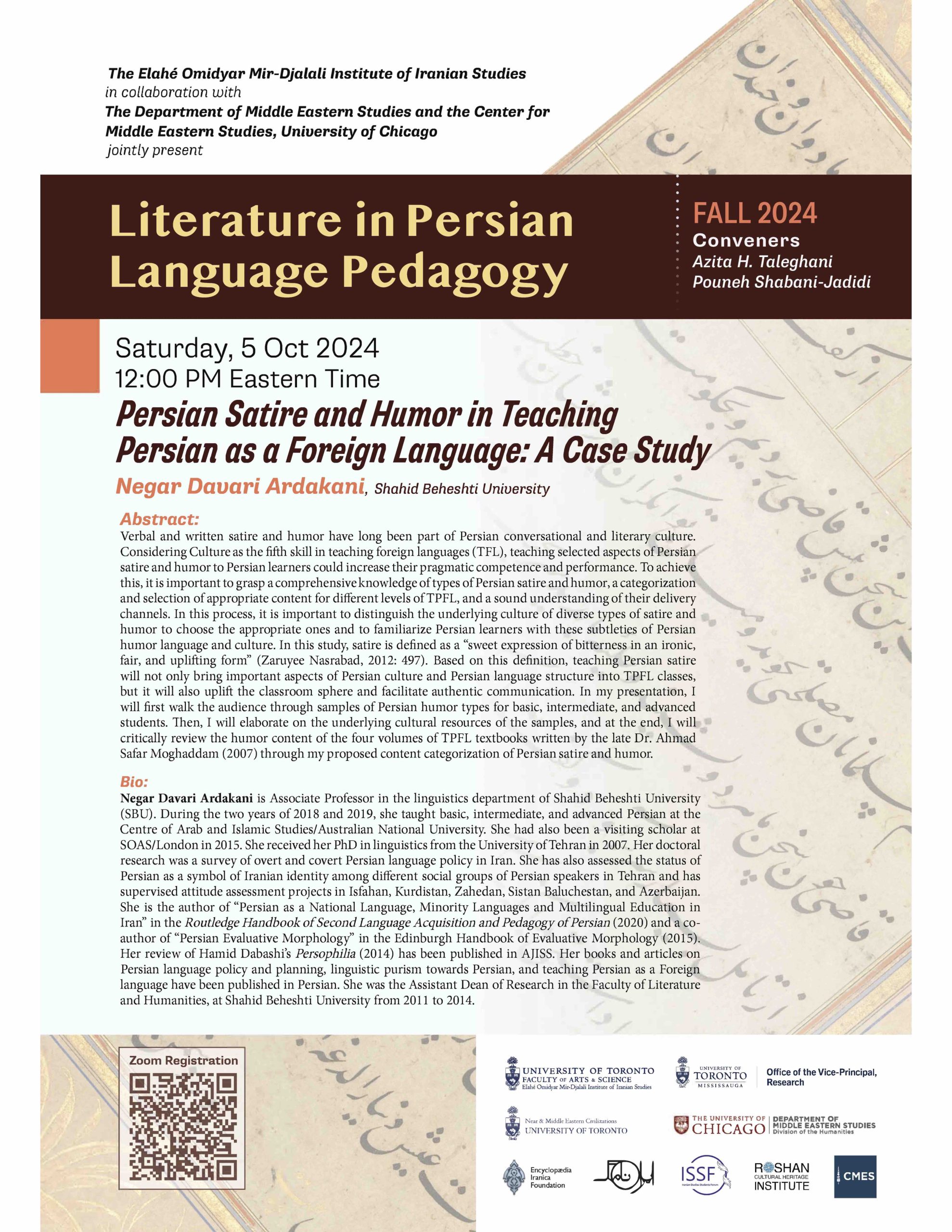

The Elahé Omidyar Mir-Djalali Institute of Iranian Studiesin collaboration with theDepartment of Middle Eastern Studies and theCenter for Middle Eastern Studies, University of Chicago jointly present:
Persian Satire and Humor in Teaching Persian as a Foreign Language: A Case Study
Negar Davari Ardakani, Associate Professor, Shahid Beheshti University Saturday, 5 October 2024, 12:00 p.m. Eastern Time (Canada and US) Zoom Meeting Registration:https://utoronto.zoom.us/meeting/register/tZEvdO2qpjMuGNwq5LZUoaVQ1W2expF2RC-0
After registering, you will receive a confirmation email containing information about joining the meeting.
Abstract:
Verbal and written satire and humor have long been part of Persian conversational and literary culture. Considering Culture as the fifth skill in teaching foreign languages (TFL), teaching selected aspects of Persian satire and humor to Persian learners could increase their pragmatic competence and performance. To achieve this, it is important to grasp a comprehensive knowledge of types of Persian satire and humor, a categorization and selection of appropriate content for different levels of TPFL, and a sound understanding of their delivery channels. In this process, it is important to distinguish the underlying culture of diverse types of satire and humor to choose the appropriate ones and to familiarize Persian learners with these subtleties of Persian humor language and culture. In this study, satire is defined as a “sweet expression of bitterness in an ironic, fair, and uplifting form” (Zaruyee Nasrabad, 2012: 497). Based on this definition, teaching Persian satire will not only bring important aspects of Persian culture and Persian language structure into TPFL classes, but it will also uplift the classroom sphere and facilitate authentic communication. In my presentation, I will first walk the audience through samples of Persian humor types for basic, intermediate, and advanced students. Then, I will elaborate on the underlying cultural resources of the samples, and at the end, I will critically review the humor content of the four volumes of TPFL textbooks written by the late Dr. Ahmad Safar Moghaddam (2007) through my proposed content categorization of Persian satire and humor.
Bio:
Negar Davari Ardakani is Associate Professor in the linguistics department of Shahid Beheshti University (SBU). During the two years of 2018 and 2019, she taught basic, intermediate, and advanced Persian at the Centre of Arab and Islamic Studies/Australian National University. She had also been a visiting scholar at SOAS/London in 2015. She received her PhD in linguistics from the University of Tehran in 2007. Her doctoral research was a survey of overt and covert Persian language policy in Iran. She has also assessed the status of Persian as a symbol of Iranian identity among different social groups of Persian speakers in Tehran and has supervised attitude assessment projects in Isfahan, Kurdistan, Zahedan, Sistan Baluchestan, and Azerbaijan. She is the author of “Persian as a National Language, Minority Languages and Multilingual Education in Iran” in the Routledge Handbook of Second Language Acquisition and Pedagogy of Persian (2020) and a co-author of “Persian Evaluative Morphology” in the Edinburgh Handbook of Evaluative Morphology (2015). Her review of Hamid Dabashi’s Persophilia (2014) has been published in AJISS. Her books and articles on Persian language policy and planning, linguistic purism towards Persian, and teaching Persian as a Foreign language have been published in Persian. She was the Assistant Dean of Research in the Faculty of Literature and Humanities, at Shahid Beheshti University from 2011 to 2014.